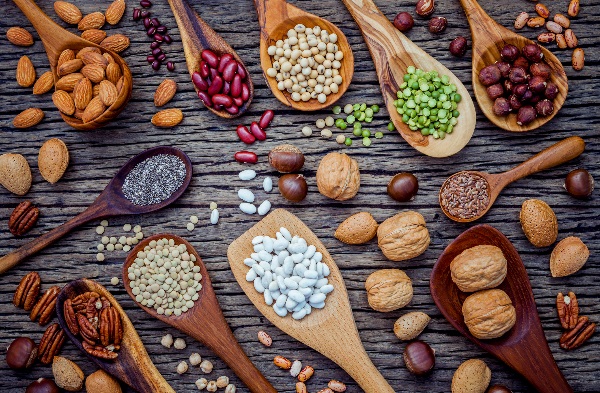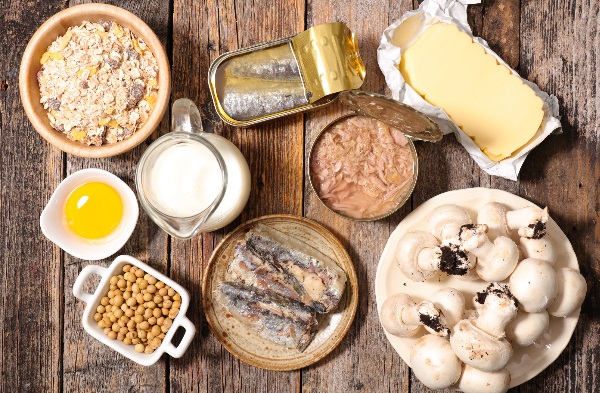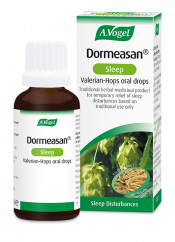1 – Tryptophan
Tryptophan is an essential amino acid that is usually found in lean forms of meat, such as turkey or chicken or dairy products like eggs, yoghurt or cheese. It can act as a precursor to vitamin B3, niacin, which in turn plays an important role in the production of serotonin, a neurotransmitter that helps to regulate your sleep/wake cycle.1 In one study, tryptophan was found to increase deep sleep while more research has hinted that tryptophan could be potentially useful in diminishing the symptoms of sleep apnoea and insomnia.2
Since tryptophan is often found in non-vegan food products, developing low levels of the nutrient isn’t unheard of however, deficiency usually arises as a result of yo-yo dieting, or eating disorders such as compulsive overeating or bulimia. Although tryptophan supplements are available, I would always recommend looking at your diet first. As I’ve just mentioned, most dietary sources of tryptophan are found in lean sources of meat and dairy products, however, below I’ve listed a few great vegan sources you can look into too!
My favourite tryptophan-boosting recipes!
2 – B vitamins
B vitamins are arguably the most diverse of all the other nutrients on the list, with each of the eight different variations providing their own distinct health benefits for different bodily functions and sleep is no exception. Below I’ve provided a brief list of all the B vitamins that are necessary for healthy sleep patterns.
B1 (thiamine): Vitamin B1, sometimes known as thiamine, isn’t quite as involved with sleep as the other B vitamins but it is primarily known for its role in converting carbohydrates into energy. It also plays a role in muscle function, brain health and mood, and a lack of thiamine is often associated with poor concentration, muscle pain and fatigue so it’s definitely important to keep an eye on your intake, particularly since thiamine can be depleted by high amounts of caffeine, alcohol and sugar.
B2 (riboflavin): Unlike most vitamins, vitamin B12, or riboflavin, must be consumed every day to ensure you are getting an adequate intake. This is because it cannot be stored within your body. Similar to thiamine, riboflavin does not have a direct impact on your sleep patterns but a deficiency will certainly cause symptoms that may. You need riboflavin for healthy red blood cell production and to support the absorption of essential minerals like iron and other B vitamins.
B3 (Niacin): Niacin, or vitamin B3, is usually associated with supporting the production of sex hormones. While only a few select studies have been undertaken, one particular study published in the Journal of Clinical Sleep Medicine, found that nicotinamide, a form of niacin, was capable of increasing REM sleep.3 However, further research is still needed to fully back up these claims.

B6 (pyridoxine): Pyridoxine, or vitamin B6, plays a number of crucial roles within your body and is responsible for over 100 metabolic enzyme reactions. It also helps to convert tryptophan, an amino acid, into serotonin, a neurotransmitter that helps to regulate your sleep/wake cycle.
B9 (folic acid): Folic acid, or vitamin B9, is also sometimes known as folate and, like most vitamins, works to support a healthy nervous system and energy levels. In particular, folic acid can act as an antioxidant within the body, preventing oxidative stress while promoting brain function. In relation to sleep, folic acid is needed for the synthesis of serotonin, which as I’ve already mentioned, is needed for a good sleep/wake cycle.
B12 (cobalamin): Cobalamin carries out a number of different functions throughout the body and can help to maintain healthy cognitive function and support your mood. When it comes to sleep, low levels of vitamin B12 can have a real impact. As our nutritionist Emma discusses in her blog, ‘Struggling to stay awake? You could need more vitamin B12!’ a B12 deficiency can be linked with increased cases of daytime fatigue as well as sleep disturbances at night!
Hopefully you now have a better understanding of the importance of B vitamins when it comes to getting a good night’s sleep. Fortunately, B vitamins can be found in a wide range of foods so you’ve got plenty of options to choose from!
- Spinach
- Whole wheat bread
- Fortified cereals
- Asparagus
- Bananas
- Egg yolks
My favourite B vitamin boosting recipes
3 – Omega 3 fatty acids
I talked quite a bit about the benefits of omega-3 for your sleep patterns in my blog ‘Can omega 3 help to improve your sleep?’ so I’ll try and summarise here.
Numerous studies have been conducted, but one that was of particular interest examined the effects of omega 3 supplements on children and found that those who had taken the supplements managed to get almost an extra hour of sleep.4 It’s also been hinted that DHA, a variation of omega 3, may be able to assist the release of melatonin the sleep hormone, as well as regulate your levels of norepinephrine, a chemical released as part of your stress response.
When it comes to sources of omega 3, most of you are probably already thinking about oily fish, such as tuna, salmon or mackerel. While these types of fish are very nutritious, it can be off putting for those that are vegan or vegetarian, which is why I’ve managed to list some of the best vegan-friendly sources below.
- Chia seeds
- Walnuts
- Berries
- Flaxseed
- Cauliflower
My favourite omega-3 boosting recipes
Overnight Passion Fruit Chia Pudding
Spiced Cauliflower & Carrot Salad
4 – Potassium
Potassium is referred to as the ‘good salt’ and plays an important role when it comes to lowering your blood pressure and even increasing your growth. Scientists are also now becoming more aware of its role in sleep too. Previously low levels of potassium were associated with difficulties staying asleep, but now it’s being theorised that potassium channels could help to generate sleep, with defective potassium channels affecting the slow waves that indicate deep sleep.
Of course more research is needed, particularly since these assumptions are based on studies investigating a sleep gene in fruit flies.5 At the moment it’s believed that potassium imbalances interrupt sleep due to the role the mineral plays in reducing muscles cramps that may cause you discomfort during the night. Potassium is widely available in a variety of food sources but below are some of my favourites.
- Sweet potato
- Bananas
- Spinach
- Avocado
- Pomegranates
My favourite potassium boosting recipes
Mexican Avocado & Bean Burrito
5 – Vitamin D
Vitamin D is an essential nutrient when it comes to maintaining your immune system and your mood, however, it’s also one of the leading nutritional deficiencies in the UK, which is hardly surprising considering our less than ideal weather. Vitamin D cannot be synthesised naturally so your body relies on a combination of dietary intake and exposure to sunlight.

Low levels of vitamin D have been associated with a variety of symptoms, but recently more and more research is indicating that vitamin D may be important for healthy sleep and that deficiency may cause sleep disturbances. This could be because the areas of the brain that deal with sleep also have vitamin D receptors or because of vitamin D’s role in curbing inflammation.6
Nevertheless, some people to struggle to increase their intake of this nutrient, either due to adverse weather conditions or dietary restriction, as vitamin D is often found in dairy products. However, there are still plenty of vegan-friendly options available, as I explore below.
- Mushrooms
- Tofu
- Fortified non-dairy milks
- Alfalfa
My favourite vitamin D boosting recipes
Vegan Burgers with Alfalfa Sprouts
6 – Magnesium
Every cell and organ in your body needs magnesium to function properly so that should give you some insight into how important this mineral is. Magnesium is responsible for over 300 chemical reactions in the body, including combatting inflammation, supporting your muscles and joints and maintaining your mood.
When it comes to your sleep, it’s magnesium’s impact on the nervous system that has the most direct effect on how you sleep. Magnesium helps to promote your sleep by regulating melatonin, the sleep hormone, and relaxing your nervous system so you feel nice and calm before bedtime. It can even bind itself to GABA (gamma-aminobutyric) receptors), the neurotransmitters that help to quieten nerve activity!7
It’s hardly surprising then, that when your levels of magnesium are reduced, you suffer from a barrage of symptoms, including fatigue and insomnia. Without magnesium, you’re unable to achieve the same quality of restorative sleep, making you more vulnerable to sleep disturbances and Restless Leg Syndrome.
The good news is that magnesium is available in a wide range of food products so it’s easy to increase your intake by turning to your diet!
- Spinach
- Dark chocolate
- Almonds
- Quinoa
- Avocados
- Pumpkin seeds
My favourite magnesium boosting recipes
Coconut, Spinach and Red Lentil Dhal
7 – Selenium
Finally we arrive at selenium! An often overlooked trace mineral, selenium performs a number of vital functions within the human body such as supporting your immunity and helping to regulate your thyroid function. It’s also crucial for healthy brain function and plays an important role when it comes to preventing oxidative stress.
Low levels of selenium are often associated with a disturbed sleep pattern as a deficiency can slow down your thyroid, as well as make it more difficult to get to sleep.8 Studies have also linked this trace mineral to OSA (Obstructive Sleep Apnoea)9 so it may be worth examining how much you’re consuming. We only need small amounts of selenium so it should be relatively simple to increase your dietary intake.
- Brazil nuts
- Spinach
- Mushrooms
- Oats
- Sunflower seeds
- Wholegrain rye
- Brown rice
My favourite selenium boosting recipes
1https://www.ncbi.nlm.nih.gov/pubmed/469515/
2https://draxe.com/tryptophan/
3https://www.livestrong.com/article/506689-taking-vitamin-b3-to-help-with-sleep/
4https://www.webmd.com/diet/features/who-needs-omega-3s#2
5https://www.livestrong.com/article/545450-can-a-lack-of-potassium-disturb-sleep/
7https://www.healthline.com/nutrition/magnesium-and-sleep#section2








